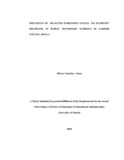| dc.description.abstract | Discipline is important for order and realization of set goals in any school.
Parenting plays a significant role in a student’s behaviour and discipline. This
study sought to establish influence of democratic, authoritarian, indulgent and
detached parenting styles shown by variation in parental control, supervision,
communication, parent-child relationship and discipline management strategies
used by parents on students’ discipline in public secondary schools in Nairobi
County. The study was guided by Social Learning Theory by Albert Bandura
(1986) and Rational Choice Theory by George Hamas (1961).The study used ex
post facto survey design which related students’ levels of discipline to parenting
styles. The target population in the study consisted of 46,858 students from where
a sample of 381 was drawn using Krejcie and Morgan Table (1970). The final
sample consisted of 146 students from Boys boarding 138 students from Girls
boarding and 95 students from mixed day schools. Using central limit theorem, 90
class teachers and 30 parents from among PTA from the three school categories
were sampled. Data collection tools were for students (questionnaires and
interview guide), for class teachers, H.O.Ds of GCDs and deputy principal
(questionnaire & interview guide) for parents interview guide.. Split half method
used to test reliability gave a coefficient of 0.8. Data was analyzed using
descriptive statistics. Pearson Product Moment Correlation Coefficient was used
to determine relationship between democratic, authoritarian, indulgent, detached
parenting practices and students’ discipline. Results of correlation between
democratic parenting style and students’ own rating of discipline levels was
significant positive relationship indicated by +.172 coefficients. Secondly, that of
authoritarian parenting style was negative as indicated -.109 coefficients. Thirdly,
there was no significant relationship with students discipline with indulgent
parents. Fourthly, detached parenting had higher association with low levels of
discipline as indicated by -.225 coefficients at 0.01% level of significance. It was
noted that problems emanating from students’ caused anxiety, lack of
concentration and indiscipline which strategies of discipline management were
unable to unearth and address. The conclusion was that parental approachability,
support, free communication of acceptable values with children, and peaceful
homely environment improved parent-student attachment which discouraged
students’ involvement in cases of indiscipline for fear of hurting supportive parent
and family. The reverse was true when students felt unloved or unsupported. The
study recommends preparation of programmes by Ministry of Education to
sensitize parents through barazars on their roles in students discipline both at
home and at school. Also, that guidance and counseling personnel should be
posted on full time basis in schools. Finally, similar studies should be replicated
in other counties to compare findings, gain students’ perspective on effective
methods of discipline in schools. | en_US |



